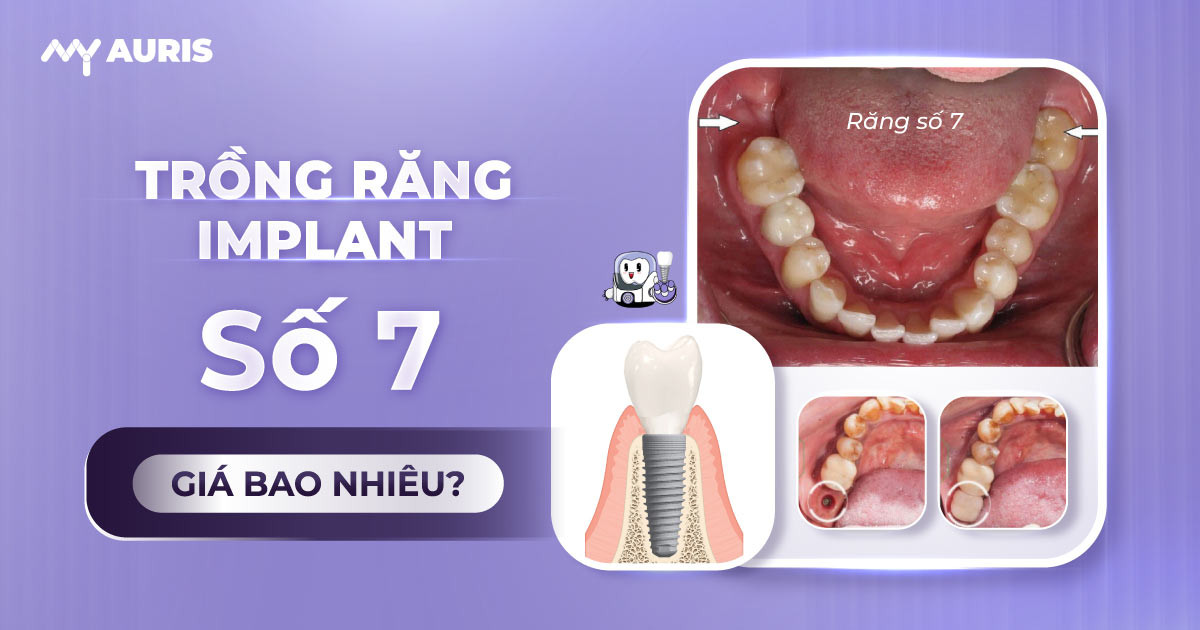Molar tooth number 7 plays an extremely important role in chewing and crushing food, similar to tooth number 6, helping to support the smooth digestive process before food goes down the intestinal tract. When this tooth is lost, the risk of digestive diseases will increase due to ineffective chewing. Therefore, implanting molars number 7 is a necessary solution, which should be done as soon as possible to ensure oral health and contribute to maintaining stable overall health.
Currently, dental implants are considered the most modern restoration method, which can be applied to all cases of tooth loss, including tooth number 7. Implant number 7 not only helps restore chewing function like real teeth but also prevents dangerous complications such as jaw bone loss, bite misalignment or prolonged pain.
What is tooth number 7? Position of tooth number 7 on the jaw
Tooth number 7 is the second largest molar, located right behind tooth number 6 and in front of tooth number 8 (also known as wisdom tooth) if any. When counted from the incisors inward, tooth number 7 is the molar located in the penultimate position on the jaw. In people who have not yet grown wisdom teeth, tooth number 7 will be the innermost tooth. An adult with complete tooth structure will have a total of 4 number 7 teeth divided equally between the upper and lower jaws, each jaw has these two teeth symmetrically.
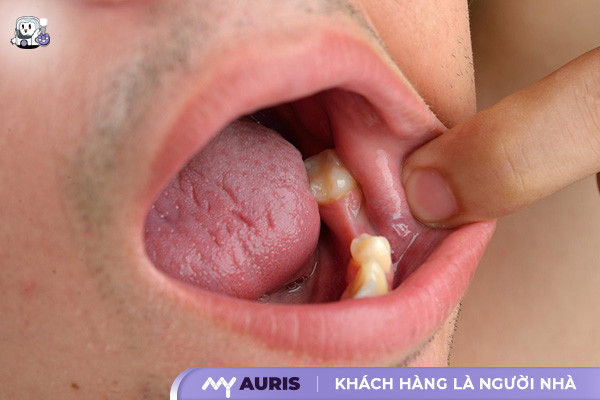
At what age does a child get tooth number 7?
Normally, the age when tooth number 7 comes out is between 12 and 13 years old. This is one of the important permanent teeth, it only grows once in life and cannot be replaced. Tooth number 7 plays a key role in eating, responsible for crushing food thanks to its position deep in the jaw.
Can tooth number 7 be replaced?
Answer tooth number 7 is not replaced. These are permanent teeth, only grow once and cannot be replaced if lost. Therefore, protecting and maintaining the health of this tooth is extremely important. In particular, because the teeth are located at the end of the jaw, an area that is difficult to clean, it is necessary to pay attention to thorough oral hygiene every day.
Dental and maxillofacial experts recommend regular dental examinations every 6 months to check general oral health andDeeply clean areas prone to plaque accumulation, especially the area of tooth number 7.
Understand the structure of tooth number 7 correctly
Tooth number 7 is Large molars play an important role in chewing and crushing food. In terms of tooth structure, tooth number 7 consists of three main layers, arranged from inside to outside as follows:
Tooth pulp: Located deep in the tooth crown, this is the living center of the tooth containing blood vessels and nerves. The pulp is divided into two parts including the root canal and the crown chamber, which has the function of controlling sensation and maintaining the life of the tooth.
Dentin: Covers the pulp and is the intermediate layer between the pulp and tooth enamel. The main ingredient is collagen, which makes dentin elastic, porous, and permeable, acting as a cushion to protect the pulp. Dentin is also the factor that determines tooth color. Because it contains tiny nerves, when eating hot and cold foods, you may experience tooth sensitivity.
Tooth enamel: The outermost layer has high tooth enamel hardness thanks to containing a lot of inorganic salts, minerals such as calcium, potassium, water and a little organic matter. Enamel is clear white, mainly distributed on the chewing surface and both sides of the tooth, protecting dentin and pulp from external factors.
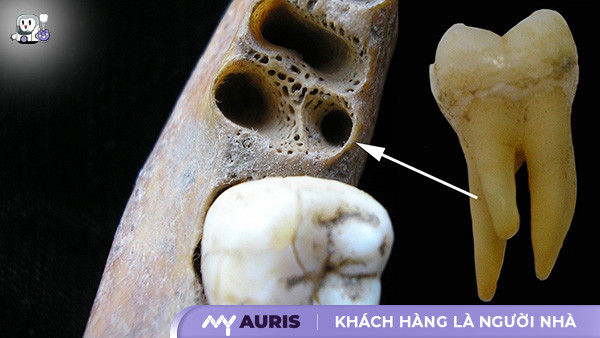
How many roots does tooth number 7 have?
Tooth number 7 is one of the teeth that plays an important role in chewing function, especially in adults. Normally, tooth number 7 in the upper jaw has 3 roots, while the lower jaw usually has only 2 roots. However, in some rare situations, tooth structure can change, in some cases teeth have fewer or more roots, making the dental treatment process more difficult and complicated.
Due to the large tooth size and quite special structure, tooth number 7 is easily affected if not properly cared for. Understanding the characteristics of the root of tooth number 7 helps dentists easily diagnose and provide appropriate treatment methods.
How many root canals does tooth number 7 have?
In terms of dental pulp, tooth number 7 usually contains 3 root canals of tooth number 7, but sometimes up to 4 root canals can be detected in people with special tooth structures. The dental pulp includes dental nerves and blood vessels, which play a role in maintaining the life and sensation of the tooth.
Normally, the pulp isProtected by a very hard layer of dentin and enamel. However, when these two protective layers are damaged, bacteria can easily penetrate inside, causing pulp infection and directly affecting the nervous system inside the tooth.
To protect comprehensive oral health, especially tooth number 7, experts at My Auris Dental Clinic in Ho Chi Minh City recommend regular dental check-ups every 6 months. This helps control bacteria, early detect problems such as tooth decay, pulpitis or damage to the root canal of tooth number 7, and conduct intensive oral hygiene, preventing future complications.
The important role of tooth number 7
Tooth number 7 is one of the forbidden teeth with the main function in chewing, coordinating with tooth number 6 to grind food into small pieces, supporting effective digestion. However, when tooth number 7 is lost – which cannot grow back – it will lead to a series of negative effects on oral health and the whole body if the tooth is not restored promptly under the advice of a dentist. have difficulty eating. Food that is not crushed properly will put great pressure on the stomach and intestines, and in the long run will negatively affect the digestive system.
Increases the risk of dental diseases: The location of tooth loss creates large gaps, easily accumulating plaque and food residue. If not cleaned thoroughly, the patient easily faces periodontitis, gingivitis, tooth decay and other serious dental diseases.
Jaw bone loss: About 2-3 months after tooth loss, this area can no longer bear the force of chewing, leading to jaw bone loss. The jawbone begins to degenerate, reducing bone density and quality, affecting the ability to restore future restorations.
Shifting teeth and losing the connection of neighboring teeth: The loss of tooth number 7 will make teeth number 6 and number 8 susceptible to shifting and tilting into the empty space. This condition affects the bite and reduces the effectiveness of orthodontics in the future.
Premature aging due to tooth loss: Tooth number 7 plays a role in keeping the facial structure balanced. When teeth are lost for a long time without restoration, the jaw bone is destroyed, cheeks are sunken, facial skin is wrinkled, leading to premature aging – making the patient look older than their real age.
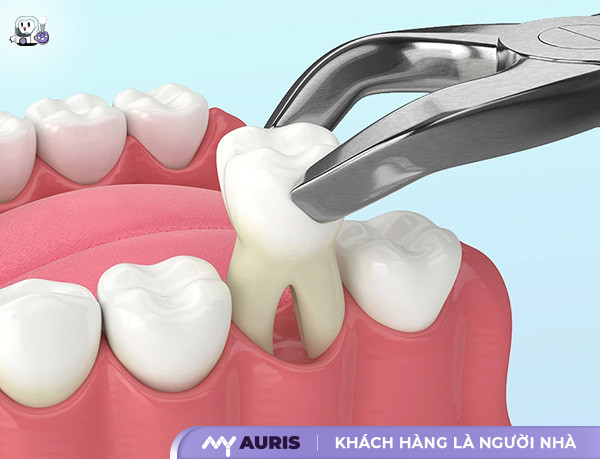
Should tooth number 7 be removed when sick?
Tooth number 7 is one of the important permanent teeth, usually erupting between the ages of 11 and 13. The upper molars will usually grow later than the lower jaw. This is a tooth that only grows once in a lifetime, there is no replacement tooth if lost, so the Proper oral care is extremely necessary.
However, many people confuse tooth number 7 with baby teeth, leading to neglecting hygiene and regular check-ups. As a result, the teeth are susceptible to diseases such as tooth decay, gingivitis, and pulpitis, thereby affecting chewing function and overall jaw health.
When tooth number 7 is damaged, the doctor will base on the specific condition to prescribe an appropriate treatment plan. The general principle is to prioritize tooth preservation, if the tooth still has the ability to recover. However, in some serious cases, tooth extraction is necessary to avoid affecting adjacent teeth and the entire jaw structure:
- There are signs of jaw bone loss, pulpitis, root cracks spreading deep into the jaw bone.
Is extraction of tooth number 7 on the upper jaw dangerous? Compared to wisdom teeth (tooth no 8), tooth number 7 causes less complications when teething, as well as less prolonged pain. Extracting tooth number 7 is often simpler, but needs to be performed by a doctor with experience and expertise. Because this is a tooth with many roots, related to a complex nerve system and located deep in the jaw bone, the extraction technique requires high precision to avoid tissue damage.
At the same time, the tooth extraction process must strictly comply with aseptic criteria, using standard sterilized medical instruments, to ensure absolute safety for the patient.
Is dental implant number 7 really real? is the optimal choice?
Among current denture methods, dental implants and porcelain bridges are highly appreciated for their ability to chew comfortably and for optimal durability. However, in cases where wisdom teeth do not grow and tooth number 7 is the last tooth on the jaw, you cannot apply porcelain bridges because of this method. requires two adjacent teeth to grind teeth as pillars. Even if you have tooth number 8, the method is difficult to succeed because tooth number 7 has a high risk of disease, affecting long-term effectiveness.
Therefore, implant number 7 is considered the optimal method, thanks to the convergence of many outstanding benefits:
Chewing function like real teeth, not limited
Tooth Implant No. 7 restores chewing function like real teeth, you will not be limited in chewing force like when using removable dentures. Thanks to that, users can feel comfortable.
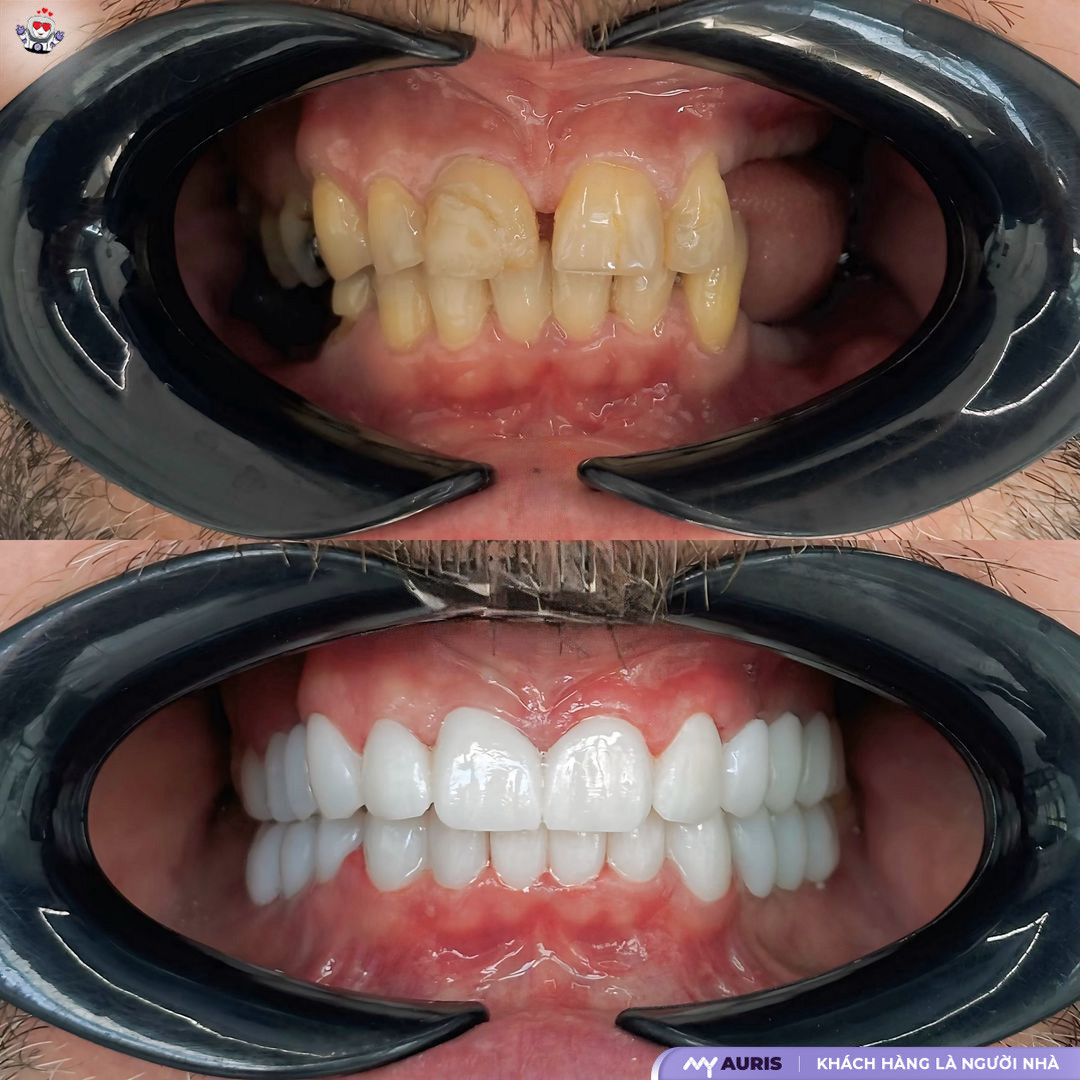 Reasonable cost
Reasonable cost
The average lifespan of dental implants is about 20 years, and can even last forever if properly cared for once, no need to worry about doing it again and again like traditional methods.
Abutment material is safe, almost painless
Tooth Implant includes 3 parts: Titanium post, Abutment joint and porcelain crown – are all common medical materials, ensuring high safety for the body. Thanks to current dental techniques, the process of implanting tooth No. 7 is almost painless, creating a comfortable feeling for customers.
Does not affect the next tooth. approach
Unlike porcelain bridges or removable dentures, implants do not require grinding of adjacent teeth, so they do not affect adjacent teeth. At the same time, this method overcomes the disadvantages of porcelain bridges such as getting in the way, causing bad breath or causing surrounding teeth to weaken over time.
Fast integration
One of the big plus points of Dental Implant No. 7 is the ability to integrate perfectly with the jaw bone. Not only does it help prevent jaw bone loss and misaligned teeth, but it also effectively overcomes the consequences of tooth loss in the long term. long.
Is tooth number 7 extraction dangerous?
Tooth number 7 is a tooth that grows only once in each person’s lifetime and cannot grow. Therefore, it is essential to take good care of your teeth and keep this important tooth healthy.
The age for permanent tooth number 7 is usually around 12 years old, when all baby teeth have been completely replaced lower jaw.
Tooth number 7 has a large shape and size, complex structure, soAlveolar number 7 depends on a number of specific factors as follows:
Affects chewing function: Losing molar number 7 will make eating more difficult. The chewing force is weakened, food is not thoroughly crushed, directly affecting the digestive system.
Jaw bone loss and gum recession: If not restored early, tooth loss will lead to jaw bone loss and gum recession, reducing the ability of the teeth to recover.
Extraction Does tooth number 7 cause sunken cheeks? The answer is yes. When tooth number 7 is lost, the cheeks will be sunken in, facial skin can sag and wrinkles will form around the mouth, making the face look older than its actual age.
Creating space in the jaw: Losing tooth number 7 will create a gap, making the adjacent teeth susceptible to tilting or shifting, affecting the entire system. chewing system and can cause bite problems.
Opposing teeth are no longer supported: Losing tooth number 7 also causes the opposing teeth to no longer be supported, creating great pressure on the jaw. This can lead to jaw muscle pain, headaches, neck and shoulder fatigue and discomfort.
Bite disturbance: Adjacent teeth will tend to move into the missing tooth space, while opposing teeth may protrude or hang down excessively. In the long run, this will create serious bite problems.
Treatment methods when tooth number 7 is damaged
Preserve tooth number 7 as a solution to limit tooth extraction
When tooth number 7 has problems such as cavities, chipped teeth, chipped teeth due to tooth trauma or impact, if there is not yet serious damage to the tooth pulp, the doctor will prioritize conservative treatment instead of recommending tooth extraction. Some popular options include:
Tooth filling: Applicable to cases of small cavities, not large chips or damage that has not spread or affected the pulp. Filling techniques help regenerate lost tooth tissue and maintain the chewing function of tooth number 7.
Ceramic crown: If more than 50% of the tooth crown is lost due to severe decay or trauma and the pulp is affected, the doctor may prescribe a porcelain crown to protect the remaining part and restore its shape. tooth.
Treatment when tooth number 7 is lost, alternative solution
In case tooth number 7 is seriously damaged and cannot be preserved, it must be removed, the following recovery methods will be considered for replacement Replacing lost teeth:
Porcelain bridge: This method uses two teeth number 6 and the adjacent tooth to act as pillars, supporting the denture to replace tooth number 7. However, if tooth number 8 has not yet erupted, tooth number 7 will be the innermost tooth, not eligible for a bridge. In addition, grinding tooth number 6 – the tooth that bears the main chewing force – can reduce chewing function, so today this method is less preferred.
Removable denture: Made of plastic or metal frame, flexible and easy to clean. Despite its low cost, dentures do not restore chewing function well and are not as fixed as real teeth. This option is usually only suitable for older people or people who have lost many adjacent teeth.
Dental Implant: This is the most optimal solution today in treating tooth loss number 7. Implant tooth structure is similar to real teeth, with a titanium post inserted deep into the jawbone, helping to recreate chewing function effectively. In particular, dental implants stand independently, do not affect tooth number 6 or neighboring teeth, and effectively prevent jaw bone loss.
Tooth number 7 plays an essential role in crushing food – it is the main force-bearing tooth in the entire jaw. However, the difficult-to-clean location makes this tooth susceptible to diseases such as tooth decay, pulpitis, chipped teeth or tooth trauma. Therefore, proper oral hygiene and regular check-ups at the dentist are very important to protect chewing function and prevent tooth loss in the future.
How much does it cost to molar implant number 7?
When losing tooth number 7, many people wonder how much it costs to implant tooth number 7 in the lower jaw, or more specifically, what factors does the cost of implanting molar number 7 depend on. In fact, there are many methods of dental implant number 7, each option has different advantages, different prices, and is suitable for each person’s oral health status.
The option with the lowest price today is the removable denture. However, this is not the optimal method because the chewing ability is not durable and can easily cause discomfort during use. On the contrary, although dental implants have a higher price, they are considered a comprehensive solution, with many outstanding advantages such as the ability to chew like real teeth, high durability, and non-invasiveness to neighboring teeth.
Not only the method, but the price of dental implants also varies between medical facilities. At centers that are invested in many modern machines and have a team of highly specialized doctors, the cost is often slightly higher, but in return, you will be guaranteed quality service.
So how much does it cost to implant tooth number 7 or how much does it cost to implant tooth number 7? There is no fixed number because the cost depends on professional assessment and specific treatment plan. However, a piece of advice from specialized doctors is: choose a reputable medical facility, do not choose poor quality places for immediate savings and then have to “avoid wasting money”.
Dental implant price list number 7 in America Auris
| Implant type | Unit | Price fluctuates
(VND) |
Healing time | Warranty |
| Biotech Korea | 1 set | 12,250,000 | 6 months | 10 years |
| Korean premium biotech | 1 set | 15,500,000 | 3 – 6 months | 15 year |
| Dentium Korea | 1 set | 19,600,000 | 3 -6 months | 20 years |
| Dentium USA | 1 Set | 35,000,000 | 2 – 4 months | 30 years |
| HIOSSEN USA | 1 set | 28,500,000 | 2 months | 50 years |
| Zimmer Biomet USA | 1 set | 70,000,000 | 3 weeks | Lifetime |
| SIC Switzerland | 1 set | 40,000,000 | 2 months | Lifetime |
| Straumann Switzerland | 1 set | 45,000,000 | 2 months | Lifetime |
Price list of porcelain teeth mounted on Implant
| Tooth type | Cost |
| Metal-free ceramic teeth Zirconia (Germany) | ~ 1,500,000 – 3,000,000 VND/tooth
(Price according to Combo – 5 year warranty) |
| Vita USA porcelain teeth | ~ 2,500,000 – 4,500,000 VND/tooth
(Price according to Combo – Warranty 8 years) |
| Lava porcelain teeth | ~ 5,500,000 – 9,000,000 VND/tooth
(Price according to Combo – 20 year warranty) |
| Emax Press porcelain teeth | ~ 6,000,000 – 12,000,000 VND/tooth
(Price according to combo – 25 year warranty) |
| Amira crystal ceramic teeth (Lisi) | ~ 8,000,000 – 14,000,000 VND/tooth
(Price according to Combo – 30 year warranty) |
| Lucy crystal porcelain teeth | ~ 10,000,000 – 16,000,000 VND/tooth
(Price according to Combo – Full warranty life) |
| Irisa Orodent high Translucent crystalline ceramic teeth | ~ 12,000,000 – 20,000,000 VND/tooth
(Price according to Combo – Lifetime warranty) |
| Endora diamond crystal ceramic teeth | ~ 15,000,000 – 30,000,000 VND/tooth
(Price according to Combo – Lifetime warranty) |
Digital tooth implant process 7 with the standard dental implant method
The procedure for growing teeth number 7 with dental implants is a modern solution to optimally restore lost teeth, ensuring long-lasting chewing and natural aesthetics. Below are the detailed steps in the process:
Step 1: Examination and consultation
First, the specialist will perform a general dental examination, combined with a 3D CT Scanner to determine the exact location of the lost tooth, evaluate the jaw bone structure and quality of the jaw bone. The patient will also undergo some additional necessary tests to ensure eligibility for transplant. After that, the doctor will advise on the appropriate type of implant and provide specific costs for the patient to understand.
Step 2: Implant the implant
After having a detailed treatment plan, the doctor anesthetizes the area where the implant will be placed to reduce pain and create a feeling of comfort. roof. The abutment implantation process takes place quickly, only taking about 7 – 10 minutes for each abutment.
Step 3: Install temporary teeth
2 days after abutment implantation, the patient will have temporary teeth attached to ensure the eating process is not interrupted, while maintaining aesthetics for a long time. waiting for the pillar to integrate with the jawbone.
Step 4: Re-examination
After a short time, the patient is scheduled for a follow-up visit to check the gum level, evaluate the ability to integrate and ensure the environment around the pillar is healthy before permanent restoration.
Step 5: Attach the ceramic crown
Once the abutment has been stably integrated, the doctor will attach the ceramic crown on top of the Implant and secure it with a specialized joint. Porcelain crowns have the same color and shape as real teeth, providing effective resultsHigh aesthetics and perfect chewing function.

Frequently asked questions about dental implants, do they hurt?
Implanting tooth number 7 using the implant method takes the capsule long?
Implant placement to replace the lost root of tooth number 7 is a modern, effective and quickly performed restoration solution. This process only takes about 7 – 10 minutes for 1 Implant, helping to save time and minimize invasiveness. After that, the patient will have a jaw impression taken and a temporary tooth will be made within 2-3 days, to ensure stability and aesthetics while waiting for the integrated post.
Next is the stage where the Implant post integrates with the jawbone, this is an important step to ensure the stability of the denture. Once the post is stable, the doctor will proceed to install the fixed porcelain tooth to complete the implant process.
Healing time for each person depends on each person’s constitution, may vary, but usually ranges from 2 – 6 months. Complying with care instructions and scheduled follow-up examinations will help shorten recovery time and ensure long-term effectiveness.
How long after tooth number 7 can be replanted?
Normally, after tooth number 7 is extracted, the ideal time to replant the tooth is 2 – 3 months. This is the period when the jawbone heals and gradually stabilizes, creating conditions for tooth number 7 to be most effective. If teeth are implanted too early, when the jawbone is not yet stable, the patient may experience loose, painful dentures, affecting chewing function and oral health. On the contrary, if tooth implantation is too late, the risk of jaw bone loss will increase, making tooth implantation difficult, requiring bone grafting, leading to increased treatment costs and prolonged recovery time. Therefore, choosing the right time to replant teeth plays an important role in restoring the ability to chew and maintain the jaw structure.
AdmireAre molars painful?
Many people are concerned about whether molar implants are painful, especially when choosing molar implants. However, at My Auris, this procedure is almost painless thanks to the application of modern techniques combined with the doctor giving local anesthesia or anesthesia before performing the procedure. This helps the patient to be completely comfortable throughout the treatment process.
During the first 1-3 days after implant placement, the patient may feel slight swelling and pain, but this condition does not last long and will be relieved with medication prescribed by a specialist. This is a normal reaction of the body and usually disappears quickly with proper care.
With a team of good, highly skilled doctors and an advanced support technology system, My Auris is committed to providing effective tooth implantation methods, ensuring the tooth implantation process is painless, safe, comfortable and gentle. Choosing to have it done at a reputable dentist like My Auris is the key factor that helps patients feel secure throughout the journey of restoring lost teeth.
Hopefully this article has answered the question of whether dental implants are painful and helps you better understand the process and benefits of dental implants. Don’t hesitate to contact us for in-depth advice and to design the most suitable treatment plan for you.
You may be interested in:
📰 Evaluation of popular Korean implants
📰 Can diabetics get dental implants? What tests are needed?
📰 How long does it take to replace a dental implant? how to extend


